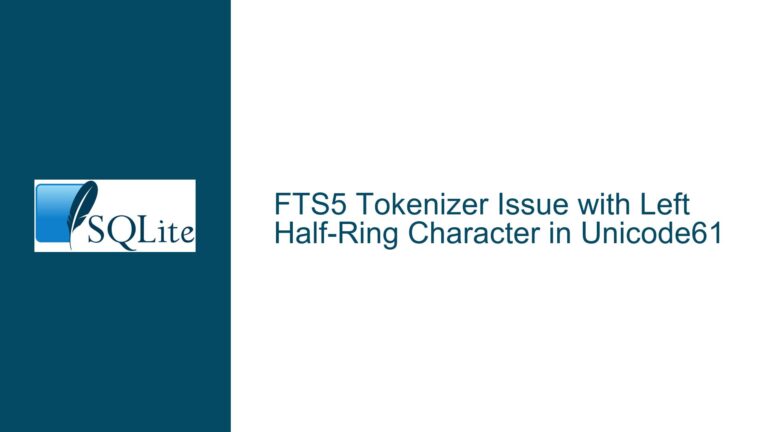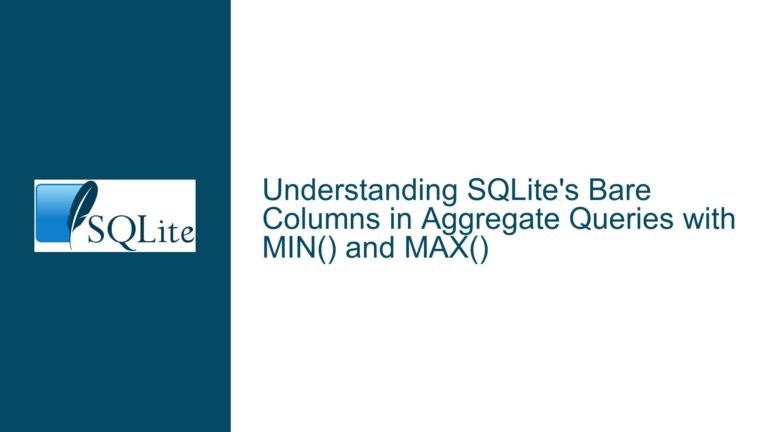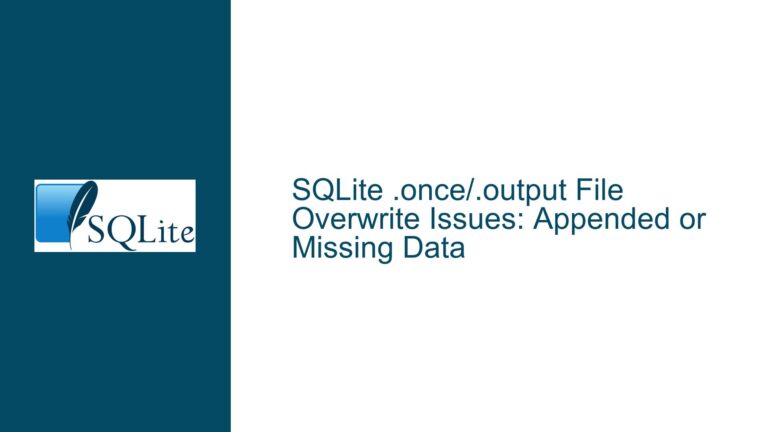Case-Insensitive Sorting in SQLite Queries: Collation and Column-Specific Application
Understanding Case Sensitivity in SQLite Column Sorting
SQLite’s default sorting behavior for text data follows the BINARY collation sequence, which distinguishes between uppercase and lowercase characters. Under this collation, uppercase letters (A-Z) are assigned lower Unicode code points than their lowercase counterparts (a-z). This results in a sorting order where all uppercase letters appear before any lowercase letters. For example, "Apple" would precede "banana," which in turn would come before "apple" if the latter were stored with a lowercase ‘a’.
The root issue arises when developers expect alphabetical sorting to treat uppercase and lowercase letters as equivalent. A user attempting to sort a mailing list by sLastName and sFirstName without case sensitivity might write a query like SELECT * FROM tblMailingList ORDER BY sLastName, sFirstName COLLATE NOCASE, assuming that COLLATE NOCASE applies to both columns. However, SQLite’s collation rules are column-specific in the ORDER BY clause. If COLLATE NOCASE is only applied to one column (e.g., sFirstName), the other column (sLastName) retains the default BINARY collation. Consequently, the sorting operation becomes partially case-sensitive: sLastName sorts with case distinction, while sFirstName sorts without it. This creates a hybrid result where the primary sort key (sLastName) adheres to case-sensitive ordering, and the secondary sort key (sFirstName) behaves case-insensitively.
This behavior is consistent with SQLite’s syntax rules for ordering terms. Each column in an ORDER BY clause can have its own collation modifier. If omitted, the column uses the default collation defined at the column level (in the schema) or the BINARY collation if unspecified. The misunderstanding often stems from assuming that a single COLLATE clause affects all columns in the ORDER BY list, which is not the case. For a fully case-insensitive sort, every column in the ORDER BY clause must explicitly include COLLATE NOCASE.
Common Missteps Leading to Partial Case-Insensitive Sorting
Incomplete Collation Scope in
ORDER BYClauses
Developers often applyCOLLATE NOCASEto only one column in a multi-columnORDER BYclause. For instance, writingORDER BY sLastName, sFirstName COLLATE NOCASEapplies case-insensitive sorting exclusively tosFirstName, leavingsLastNamesubject to the default BINARY collation. This results in a primary sort that is case-sensitive and a secondary sort that is case-insensitive—a combination that rarely aligns with user expectations.Assumption of Global Collation Settings
SQLite does not support global collation overrides for individual queries. While collations can be defined at the column level in the schema (e.g.,CREATE TABLE tbl (col TEXT COLLATE NOCASE)), these settings do not automatically propagate toORDER BYclauses. Queries must explicitly reapplyCOLLATE NOCASEunless the column’s schema-defined collation already includes it. Relying on schema-level collation without verifying its presence in theORDER BYclause is a common oversight.Misinterpretation of Collation Precedence
Collation precedence rules in SQLite prioritize explicitCOLLATEclauses in queries over schema-defined collations. If a column is defined withCOLLATE NOCASEin the schema but theORDER BYclause lacks this modifier, the query will still use BINARY collation for that column. This can lead to unexpected case-sensitive sorting even when the schema suggests otherwise.Overlooking Expression-Based Sorting
When sorting by expressions or functions (e.g.,UPPER(sLastName)), developers may forget to includeCOLLATE NOCASE, assuming the function inherently normalizes case. However, functions likeUPPER()orLOWER()do not automatically apply a collation; the sorted result still adheres to the default BINARY rules unless explicitly overridden.
Implementing Comprehensive Case-Insensitive Ordering Across Multiple Columns
Step 1: Apply COLLATE NOCASE to All Columns in ORDER BY
Modify the ORDER BY clause to include COLLATE NOCASE for every column requiring case-insensitive sorting. For the tblMailingList example:
SELECT *
FROM tblMailingList
ORDER BY sLastName COLLATE NOCASE, sFirstName COLLATE NOCASE;
This ensures both sLastName and sFirstName are sorted without case sensitivity. If additional columns are included in the sort, repeat the collation modifier for each.
Step 2: Use a Common Table Expression (CTE) for Collation Consistency
For queries with complex sorting logic or repeated column references, define a CTE to apply COLLATE NOCASE once and reuse the transformed columns:
WITH NormalizedNames AS (
SELECT
sLastName COLLATE NOCASE AS nLastName,
sFirstName COLLATE NOCASE AS nFirstName
FROM tblMailingList
)
SELECT *
FROM NormalizedNames
ORDER BY nLastName, nFirstName;
This approach reduces redundancy and centralizes collation settings.
Step 3: Define Case-Insensitive Collation at the Schema Level
Alter the table schema to apply COLLATE NOCASE directly to the columns, ensuring all future queries inherit this setting unless explicitly overridden:
CREATE TABLE tblMailingList (
sLastName TEXT COLLATE NOCASE,
sFirstName TEXT COLLATE NOCASE
);
For existing tables, recreate the table or use ALTER TABLE to modify column collation (note that SQLite’s ALTER TABLE has limitations; a table rebuild may be necessary).
Step 4: Utilize the LOWER() Function with Caution
While LOWER(sLastName) converts text to lowercase, it does not inherently apply a case-insensitive collation. To combine case folding with collation:
SELECT *
FROM tblMailingList
ORDER BY LOWER(sLastName) COLLATE NOCASE, LOWER(sFirstName) COLLATE NOCASE;
This method is less efficient than COLLATE NOCASE alone, as it introduces a function call overhead.
Step 5: Verify Collation Behavior with Test Data
Insert test records with mixed-case values to validate sorting:
INSERT INTO tblMailingList (sLastName, sFirstName) VALUES
('smith', 'John'),
('Smith', 'anna'),
('SMITH', 'Bob');
Execute the query and confirm that all variants of "Smith" are grouped together, sorted by sFirstName case-insensitively.
Step 6: Address Locale-Specific Collation Needs
For languages with accents or special characters, consider using COLLATE LOCALIZED or a custom collation. SQLite’s NOCASE collation only handles ASCII characters; Unicode-aware case folding requires additional extensions or application-side processing.
Step 7: Profile Query Performance
Case-insensitive sorting can impact performance if indexes are not utilized. Ensure columns with COLLATE NOCASE in queries have corresponding indexes defined with the same collation:
CREATE INDEX idx_lastname_nocase ON tblMailingList (sLastName COLLATE NOCASE);
Without matching collation, SQLite may ignore the index, leading to full table scans.
By methodically applying COLLATE NOCASE to each column in the ORDER BY clause, aligning schema definitions with query requirements, and validating results with test data, developers can achieve reliable case-insensitive sorting in SQLite. Understanding the interaction between collation settings, schema design, and query syntax is critical to avoiding partial or inconsistent sorting outcomes.






